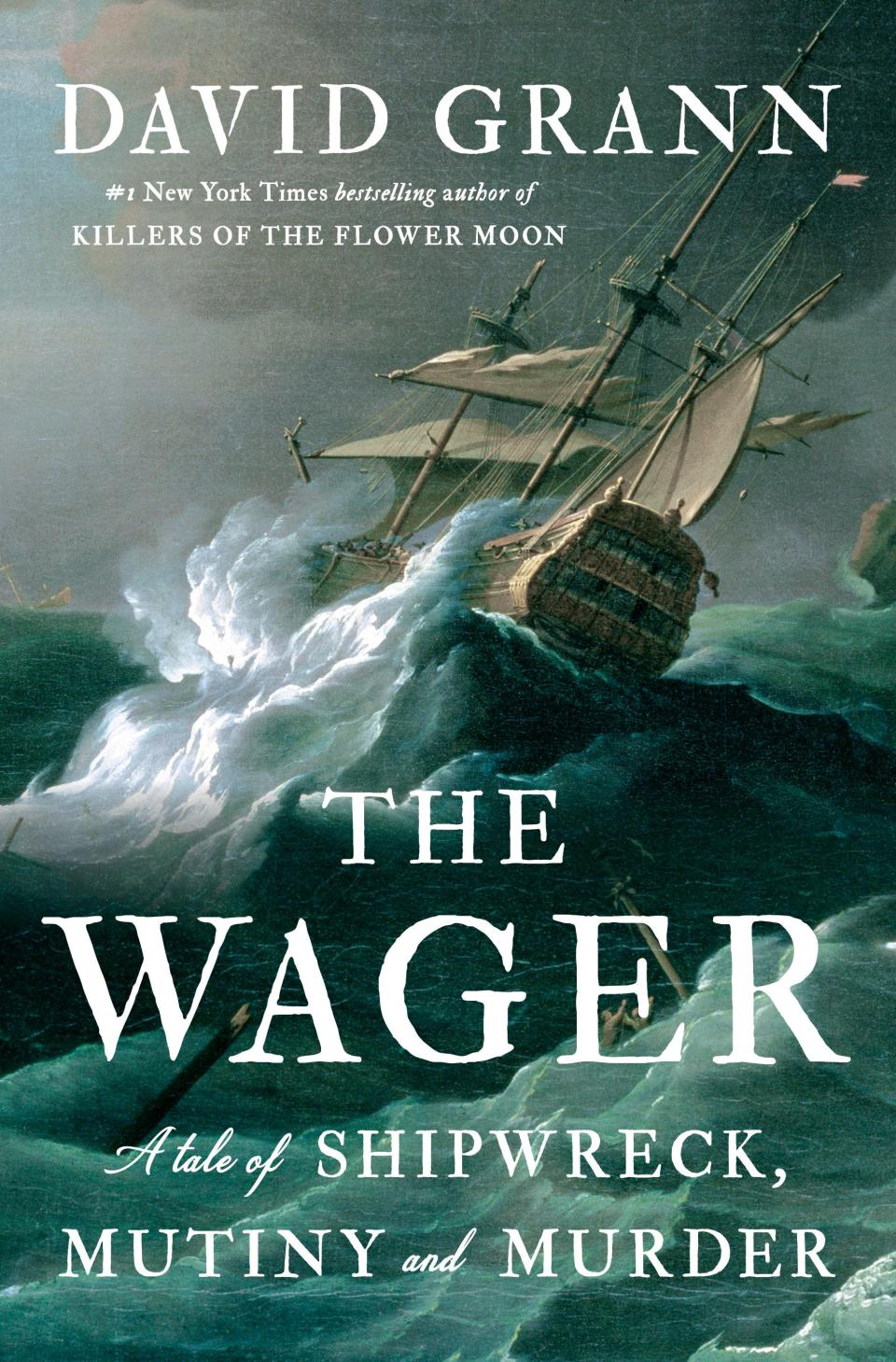David Grann to close Savannah Book Festival with his latest, 'The Wager'
- Oops!Something went wrong.Please try again later.
David Grann didn’t set out to write a best seller. But eight years ago, when he happened upon the story of a young sailor’s account surviving a British naval shipwreck in South America, he knew he had something. After two years poring over 18th century maritime archives, Grann began writing, navigating the tempestuous tale of HMS Wager, her wreckage, mutiny, and the story’s greater implications for human behavior.
New York Times #1 best-selling author, David Grann, visits Savannah, Sunday, Feb. 18, to deliver the closing address of the 2024 Savannah Book Festival at the Trustees Theater. He’ll speak about his most recent work, “The Wager: A Tale of Shipwreck, Mutiny and Murder” and highlight some of his prize-winning, meticulously researched non-fiction. Tickets are $30.

Born into a high-achieving family — his mother was the first woman CEO of Putnam Penguin Publishing; his father a nationally acclaimed oncologist — Grann’s early life anchored him to curiosity and scholastic pursuit. After degrees from Connecticut College, Tufts University and Boston University, in 2003, he joined the staff at The New Yorker with a penchant for long-form investigative journalism.
In 2009, “The Lost City of Z: A Tale of Deadly Obsession in the Amazon” landed Grann’s work for the first time on the New York Times best-seller list. He went on to write two more celebrated books, “Killers of the Flower Moon” and “White Darkness,” before publication of “The Wager” in spring 2023.
A midshipman's historical account leads to Grann's latest best seller
In late 2016, while fishing around the topic of mutiny, Grann found young John Byron’s tale serving aboard HMS Wager. In 1740, the Wager was a ship in a British squadron of five tasked with secret mission of intercepting a Spanish transport vessel laden with gold and silver. John Byron, as history would later serve, become grandfather to poet, Lord Byron, who in turn drew from his ancestor’s naval adventures in crafting parts of his satirical epic poem “Don Juan.”
“I came across a digital scan of John Byron’s account, a 16-year-old midshipman on the Wager,” recalled Grann. “He wrote of ‘that last extremity,’ cannibalism. I began looking further into it to see what this story was about, and I found various accounts of what happened. The surviving crew faced a court martial in England, and because they feared being executed, each narrative had its shade, each arguing about who was telling the truth. Some allege false journals and double accounts. In many ways, it mirrors today as a parable for our own turbulent times, and the battle over history and who gets to tell it.”
In his next phase of research, Grann chartered a small private boat to southern Patagonia and Wager Island, “trying to get as close to people’s consciousness as possible.” He found a Chilean captain about 350-miles north of the shipwreck site willing to lead the venture. Their wooden boat was top-heavy, heated by wood stove and no more than 52-feet in length. They obtained water from glacial streams, chopped wood and hauled it aboard to stay warm. Cruising through inland channels, the craft plied the inlets gracefully but in open water, she pitched and rolled in precarious fervor.
“After five days we had to venture into the ocean to get to the island,” recalled Grann. “In rough seas with a top-heavy boat, we were tossed about like a ping pong ball. I’d taken seasickness medicine and sat below. I sat there about 10 hours a day in rough seas for days listening to an Audible recording of 'Moby Dick' as we passed through the Gulf of Pain to Wager Island.”

Nearly 1,000 miles south of Santiago, Chile, and north of Cape Horn by roughly 650 miles, Wager Island persists in an isolated snarl of sub-Antarctic high winds, steep crags and very little game or vegetation. Once stranded, the ship’s remaining crew faced a new set of harrowing challenges which Grann experienced first-hand in 2019.
“Wager Island remains cold, desolate, raining and sleeting,” emphasized Grann. “Temperatures hover around 34 or 32 degrees. It’s constantly so windy and rainy. These men were likely suffering from hypothermia in addition to no food. There were some mussels, clams, wild celery, some birds, but no other animals. I could begin to understand why their society would disintegrate. It’s a place where the soul of man would die. This trip was instrumental in helping me understand what they went through.”
And in this crucible of extremes the rigid hierarchical system of British naval command broke down. A ship-smart and sea-hardened gunner stood as leader for a large faction unsatisfied with the captain’s leadership. The captain had his own supporters, mostly officers and men of rank. In the breakdown of order, squabbles erupted, then physical altercations, then gunshot and murder. Yet through the turmoil, several literate sailors kept detailed accounts.
“Wager Island became laboratory that would test humans under extreme conditions,” said Grann. “How people behave under extreme duress—it’s kindness then shocking moments of brutality the next. Also, it’s how we tell a story, how we all try to emerge as hero, which was especially important to these men facing court martial and who could be hanged. When they are on the island, they are aware that if they do survive, they will have to stand in judgement. Creating a narrative that will withstand public scrutiny is crucial, and once they get into trouble and are shipped wrecked, no question, the gunner is conscious of shaping the story as a piece of evidence to justify his actions. In many ways this story provides illustration of how history is told, how nations and empires shape their stories.”
From initial subject investigation to final publication, writing “The Wager” took about six and a half years. For Grann, finding a story worth pursuing comes from investing time in researching nuance — it’s about finding material compelling enough to work with for months, years even, to understand its truth and pivotal details. And sitting down, digging in to do the work of writing and re-writing, often over and over again.
“You become a writer because you think you don’t have a superpower,” chuckled Grann. “Curiosity is an essential part of being a writer. Curiosity leads you to the story. The stories you choose to tell, then, are so important because this is the material you excavate and become involved with in making sense of a bewildering world. It’s no great secret. The truth is, writing is a craft. It involves a lot of sitting and doing. A writer is willing to sit for eight hours rewriting the same sentence, getting better by doing. Writing and sitting, being curious and getting out in the world, going to archives, always listening this is writing. You must cultivate being a habitual professional snoop.”
If you go >>
What: Closing Address with David Grann, Savannah Book Festival 2024
When: 2 p.m., Feb. 18
Where: Trustees Theater, 216 E. Broughton St., Savannah
Tickets: $30, tickets.scadboxoffice.com/5966
Info: savannahbookfestival.org
This article originally appeared on Savannah Morning News: David Grann delivers closing address at 17th annual Savannah Book Festival

